Global Careers Week

Global Careers Week took place from the 4th March- 8th March and was organised by Leeds University Business School. As part of this various events were held all over campus to make students aware of different career opportunities and prepare them for work in the corporate world.
Monday
Developing your Soft Skills - written by Jessica
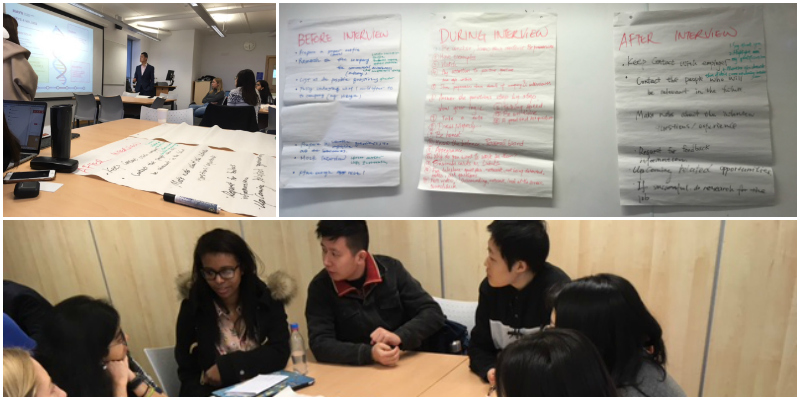
During two hours of the first day, Wei Wei, an International Recruitment Manager for Hays, conducted the workshop “Developing Your Soft Skills", giving tips to University of Leeds students on how to become more competitive for interviews. Wei Wei told the students that his first job after graduation was not right for him because he accepted without the proper knowledge of the company and its culture. For this reason, he ended up quitting the job after three months. Things changed when he found a company which is passionate about, and that has the right culture for him and that's why he has been working for Hays for 15 years – 12 in Japan and 3 in the UK.
"I don't speak perfect English" is one of the excuses that Wei Wei said that many international students use as excuses for not fully reach their potential in the market, especially when they want to work for a bilingual company. That was something that hit me because I, as a non-native, sometimes tell as a reason for not getting jobs interviews. However, after the workshop, I realized that I could improve my skills and establish myself as an international talent.
Depending on the company, CV doesn't mean everything and having the right behavioural skills are more important than saying you have experience in a position. Hays, for instance, value candidates who are inquisitive and committed to learning, ambitious people who can deal with objections and that are passionate about people, can engage with them and work as a team.
Students in the session were split into three teams and had 20 minutes to discuss three phases of an interview: before, during and after. After that, all members of each group had to take part in a presentation about their ideas. Wei Wei made important notes about what thing that we came up with, saying why we were right or not about our suggestions.
For “before the interview", we established that it is vital to have enough knowledge about the company as you might come across a question to show that you've done your research. Be prepared for some common questions and do a mock interview might also help students to feel more confident for when the moment comes. However, candidates shouldn't over prepare and try to anticipate all possible questions as they might be surprised with unexpected queries and let it show during the interview.
Tips such as “don’t be nervous” are usually the first one to come up when we think about the “during the interview” stage. Although important, Hay’s recruiter showed us that we have much more to worry about. Some hints include: be honest if you don't know something, have clear on your mind and tell the interviewer why that job is for you and express passion and energy.
Finally, after the interview, you can revise your possible mistakes as they can help you to prepare better for the next time, be patient waiting for an answer and request feedback from the company if you were not successful. If you will have a second interview with the same firm, as a part of the process, keep researching more about them and show some improvement for the second one.
As a student trying to develop more employable skills in a country different from mine, I found the workshop very helpful and now I am aware of some challenges I need to overcome and some extra preparation that I need to consider when applying for a position.
Speed Networking - written by Leyao
This is the first day of Global Career Week, as it’s getting closer to the graduation season, we are all enthusiastic about finding new insights and chances.
This networking event allows us to talk face-to-face to a number of different international alumni & employers and gives us the opportunity to ask any career questions that you may have but Google searches won’t be able to answer!
Right before it starts, they provided us with a social time to meet with new people and get familiar with each other along with food and drink for dinner. Under a relaxing and delightful atmosphere, we went in the first section, representatives from 7 different companies gave us a brief introduction about themselves, and then we jumped straight to the topic – speed networking.
The organiser divided us into seven tables, each round gave us 7 minutes to throw all our questions to the employers, which gained us more career insights both from the perspective of employers and peers. We got to share our concerns about job hunting in the UK, listen to stories and background of our alumni, and study what we can do to better prepare ourselves for future career.
This is a great opportunity to develop your skills and knowledge of the global marketplace and to stake your place in it! Take the lead this semester by actively developing yourself by becoming career-ready.
Tuesday
Acted Presentation - written by Jessica
On Tuesday students had the chance to hear from Acted, an NGO who recruits, usually masters students, for an internship with humanitarian care. Ziggy Garewal, the UK representative who has been working for 15 years of Acted, gave us an inspirational talk about how it is to work for an NGO and what is necessary to pursue a career in this area. Acted has benefited around 14 million people in 37 countries where they run about 500 projects. Acted focus on covering aspects of humanitarian and development crises and on promoting inclusive and sustainable growth. Some of the countries they operate are Somalia, Afghanistan, Iraq and Syria, amongst others.
As it’s a job that requires a lot a total commitment, Ziggy said that usually young people without kids are more willing to consider it because it involves living on countries with crises and also might require frequent changes of bases. Acted are always looking for more talented people to start as an internship. She advises that the internship is a stage of the training to see if the candidate fits the position.
During this time, interns won’t receive a salary (but expenses as flight tickets, visa, accommodation and food are provided) but after signing for a contract, a monthly salary will be added to the mentioned benefits. What they are looking for are passionate people who can adapt and that have the human skills to deliver excellent service even when facing difficult situations.
The presentation was certainly inspiring for those who want to acquire the knowledge of working for a non-Governmental Organization and that will have the chance to help people while facing a new culture and country. It might not be an easy job, but it seems to be very rewarding and a once-life experience. The presentation helped me to understand that we need to find their vocation and talent and go for it and, if we do so, we will certainly succeed.
Wednesday
Cultural Misconceptions in the Workforce – written by Doreen
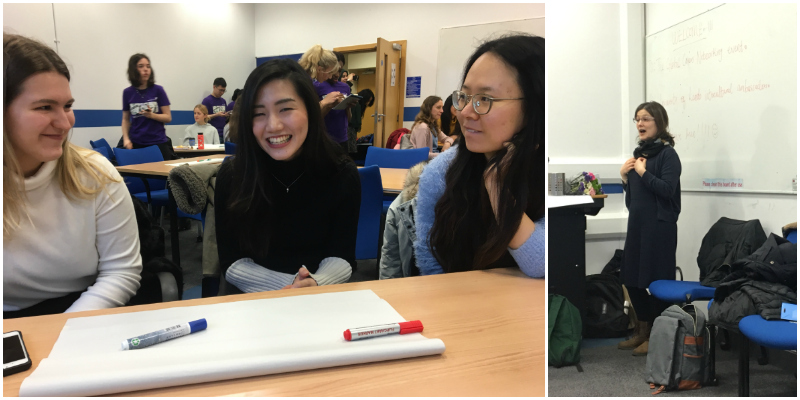
On the 5th of March I attended an event organised by the Intercultural Ambassadors of the Global Community called Cultural Misinterpretations at the Workplace. The event was held in the business school at 4 pm. The event started off with a brief ice breaker where we got the chance to get to know the people sitting on our table. After the brief round of introductions the guest speaker for the evening was introduced. Lucia, a member of the study abroad office at the University has worked in offices around the world. She went o share her experiences of how her experience was moving to the UK from Italy. She shared her experiences and spoke about stereotypes that we all believe. She gave us suggestions on how to overcome these issues and be better workers. She even gave us a small activity to show us how important it is to think beyond the box. After this there was a short break where they provided us refreshments.
The next thing that they had organised were two games. One was to identify solutions to various workplace situations and how one must overcome these problems and be receptive to others. And the second was a game to communicate effectively without speaking which aimed to show us how important communication is and how we need to pay attention while communicating. The whole experience was enjoyable and informative. The interactive games and speaking spaces allowed us to share our views and meet people from other cultures. The speaker had great insights and in all it was an evening well spent.
Thursday
Ward Hadaway Visa Advice Session – written by Emily
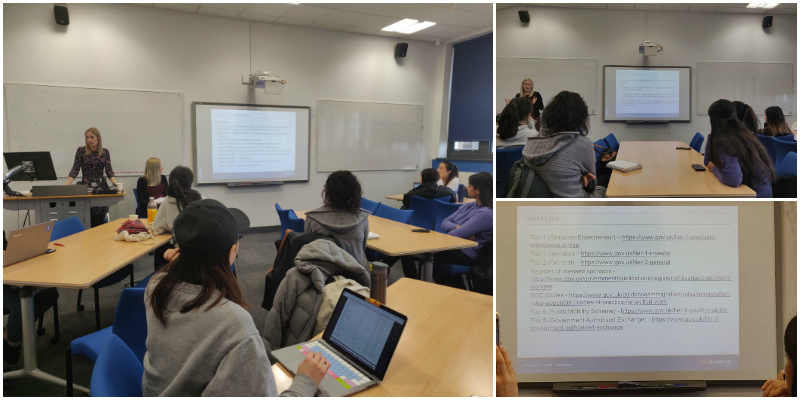
The Ward Hadaway Visa Advice Session was an excellent crash course in all things visa-related for international students. Flora and Natalie walked us through each kind of visa we might need, offering practical advice and step-by-step examples of how we might want to attain, extend, or change our visas during or after our studies. After explaining the UK Points Based System for visas, they walked us through Tier 1, Tier 2, Tier 4, and Tier 5 visas and the process these might require, noting that Tier 2 (General) and Tier 5 (Temporary-Worker Government Authorised Exchange or Youth Mobility Scheme) visas are the two kinds most suitable for students wanting to get a job in the UK after graduation.
The Tier 2 visa is a general work visa that requires a registered UK sponsor. We learned that you can search through SOC codes (Standard Classification System) on the UVI website to find jobs that are registered to sponsor international employees. Flora explained eligibility rules in regards to finance and documentation and described different settlement options depending on how long you may want a visa for. Most importantly, she advised that students wanting to switch to a Tier 2 should look for full-time jobs whilst on their Tier 4 student visa because it makes the process much smoother! She went on to explain that the Tier 5 (Temporary-Worker Government Authorised Exchange) visa is suitable if you are looking for an internship and don't intend to stay in the UK permanently. Alternatively, the Tier 5 (Youth Mobility Scheme) is great for students 18-30 from certain countries who want to stay and work in the UK for shorter lengths of time.
Flora and Natalie gave us lots of information on alternative types of visas for specific purposes, such as entrepreneurial visas or exceptional talent-based visas. Because they work as Employment and Immigration Solicitors, they were able to walk us through examples of clients who had gone through similar processes of switching from a student visa to a work visa. They were able to answer many of our specific questions in regards to finding jobs, staying in Leeds, and what possible deadlines may look like. After attending the session I felt less anxious about looking for jobs in Leeds because I now know exactly what to look for if I want to extend my time here. Overall, it was an excellent session jam-packed with very useful information!
Your Journey to an Intercultural Career – written by Leyao
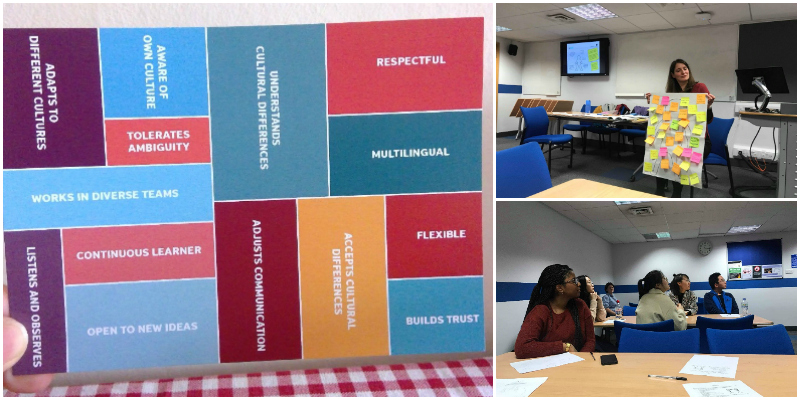
This is a very interesting event aiming to help us get ready to step out of our comfort zone, get involved with intercultural events going on around the campus and prepare ourselves for ideal intercultural careers.
It started with an arrival activity requiring us to draw a picture/map of your life, including your culture background, family, experiences, etc. After self-introduction in front of the whole group, we shared our pictures in pairs. During this section, I met an Egyptian girl who was a swimming metal holder, although we are from different countries and background, we do share the same spirit of experiencing and exploring new life in Leeds.
After sharing some theories, the organisers guided us to think about some trials that an intercultural person should have, we contributed a lot of ideas and pasted them on an “intercultural man”. It gave us new perspectives to consider how to be more international and intercultural. Be flexible, be adaptive and communications are most frequently mentioned by us.
All these discussions and sharing providing us with more ideas and perspectives to shape ourselves into a more intercultural person in the future. In the last section, the organisers encouraged us to take a minute to digest all information we have received during the journey, reflect them on ourselves and let us assess our own intercultural abilities. Then, they led us to envision ourselves in the next few years, what improvements do we want, and what we can do from today to achieve them. Below, I share a postcard with key traits for intercultural careers.
Overall, it was an informal and relaxing event that allow us meet new people, gain new insights and reflect on our own intercultural abilities, most importantly, it provides us with new visions and actions that help contribute to prepare ourselves to pursue intercultural careers more efficiently and effectively.
Friday
International Women’s Day Conference – written by Catalina
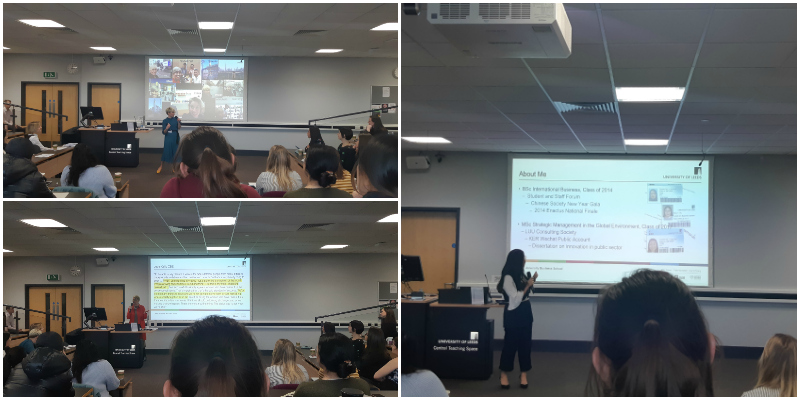
Three remarkable female alumni from the Business School, visited the university to talk about their careers, student experiences and life as women in the business world. The event started with delicious food and was then followed by three insightful talks from Wilma Wu, Lucia Fuertes and Liza Kellett.
Wilma, who was also a Link to Leeds ambassador in 2017, was the first speaker and she shared her experience as a student and as a worker in the public sector. Whilst studying at Leeds, she was heavily involved in various projects, including being a trustee at the Union and running a campaign for student executive officer, which helped to develop her skills and find her interest in the public sector. Nowadays, she works as an associate in Grant Thornton and gets to help people on a daily basis, which she says gives meaning and value to her work.
Following Wilma’s tips which included networking as much as possible and never giving up, was Lucia’s talk where she showed the reality of working in International Business and how she deals with some of those challenges. Lucia who travels around the world as part of her job, revealed how doing so involves high amounts of hard work, jet-lag and even difficulties to find food; however, she emphasized on how it is a wonderful experience that has allowed her to discover new cultures and learn the business etiquette in places like Slovakia and Japan. Additionally, she talked about how soft skills like communication and emotional intelligence, were key to overcoming the challenges she has encountered in the male-dominated industry she works in.
She finished her talk by encouraging people to get involved as much as possible and to develop new skills frequently.
Closing the event was Liza Kellett who shared her experience as a successful female CEO and addressed the work she does through social enterprises. Liza narrated her story and how she managed unexpected life events which challenged her after graduating university. Despite the difficulties she has been the CEO of multiple successful social enterprises where she has implemented the skills and teachings that business leaders like Jude Kelly taught her.Nowadays, she has a new venture called Trust Leeds which is dedicated to helping those living in disadvantaged financial situations and is already working on a new social project.
